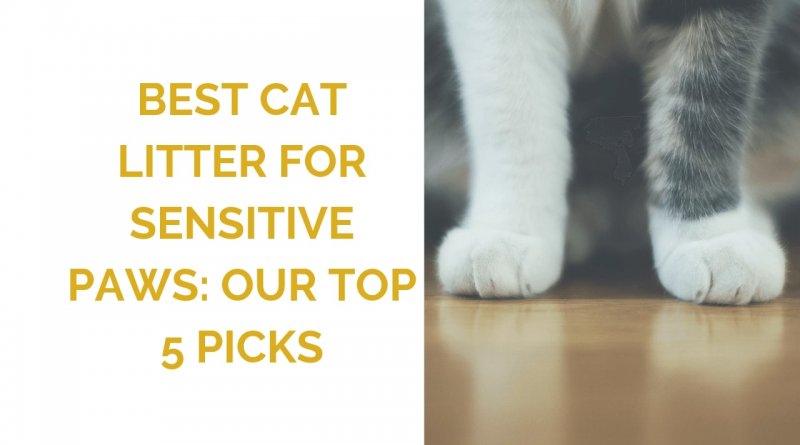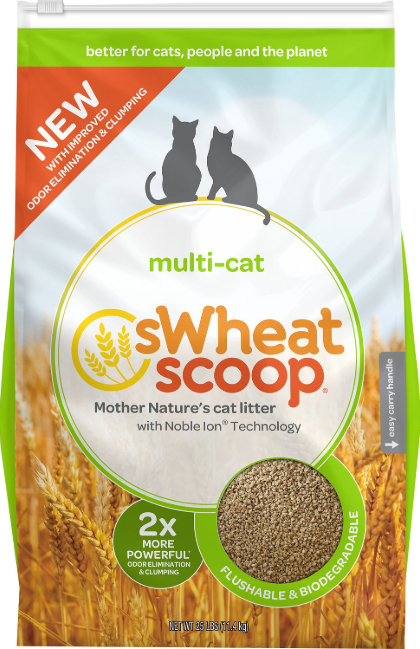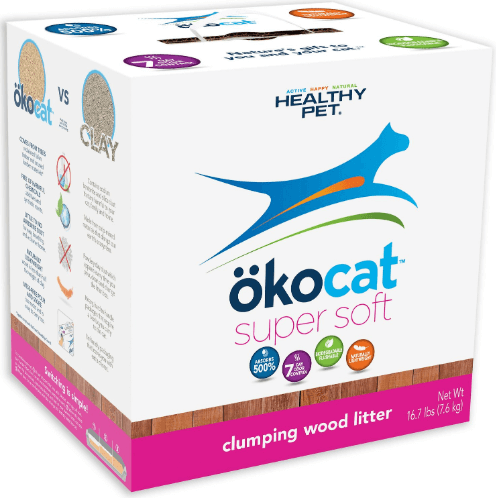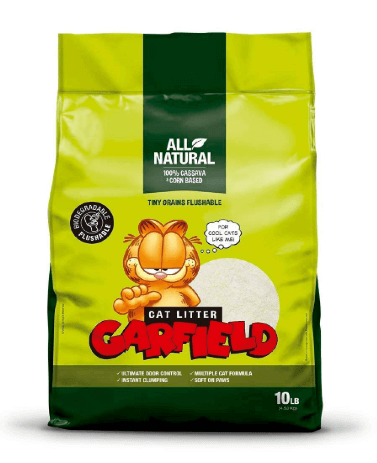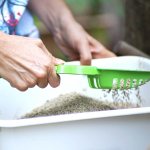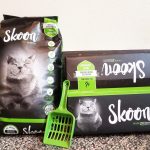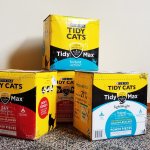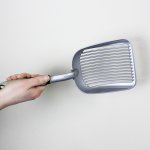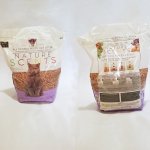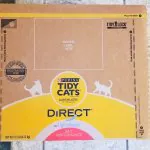Best Cat Litter for Sensitive Paws
Last Updated on
The best cat litter for sensitive paws is soft, low-dust, and made without irritating fragrances or additives.
Paw comfort should be a consideration for every cat, but some have special needs. Cats who have been declawed, have scratches on their paw pads, and young kittens may require extra-soft and extra-gentle litter.
In this article, we’ll discuss the qualities that make cat litter ideal for cats with tender tootsies. These are the criteria we used to select the top 5 best litters on the market. Keep reading for our reviews of the best cat litter for sensitive paws.
Here’s what to look for in cat litter for sensitive paws.
Whether your cat has sensitive paws due to allergies, injury, or declawing, the following characteristics will help to keep her paws comfortable in the litter box.
If your cat has injured paw pads, avoid dusty litter.
Litter that’s very dusty will get into your cat’s wounds, which impedes healing. To keep your cat’s wounds clean and help them to heal faster, avoid dusty litter. Clay litter is usually the dustiest type, but high-dust litter comes in many shapes and forms. Wheat litter, corn litter, and wood litter can all produce plumes of dust and contaminate your cat’s sensitive wounds.
Look for cat litter made from soft materials.
Silica litter and clay are the hardest types of litter, meaning that each granule of litter pokes into your cat’s paw pads and might be painful on sensitive paws. Pellet-style litter can also be quite harsh. Like walking on gravel, treading on pellet-style litter is uncomfortable at best and painful at worst.
Instead of big, hard pellets or harsh granules, look for gentle litter made from soft materials. Cats with wounded paws should avoid particularly fine granules that might stick in their wounds, but other cats with sensitive paws can get away with very fine, soft litter. Garfield’s corn and cassava litter is a good example. It has an ultrafine texture that’s no more painful than a walk on a white sand beach.
Avoid scented cat litter.
Just like people with sensitive skin are best off not using scented lotions, cats with sensitive paws shouldn’t use scented litter. While it’s a particularly bad idea for cats with sensitive skin, scented litter is seldom a good choice for any cat. Cats have a very acute sense of smell and what may seem like a light scent to you may be overpowering for your cat. Avoid any type of scented cat litter, particularly if that scent is artificial.
Sometimes a cat litter isn’t marked as scented but does contain added fragrances. If you’re in doubt, read the customer reviews and search for the query “scent” or “fragrance” to determine if reviewers are mentioning an undisclosed scent.
In general, if cat litter isn’t labeled “unscented”, you can assume it’s scented. Look for litter specifically marketed as an unscented product and you’ll be safe.
Avoid cat litter made with artificial dyes.
Litter with colored granules contain dyes that could irritate your cat’s sensitive paws. To protect those delicate paws, avoid multicolored litter and opt for 100% natural products.
Remember that some cats are sensitive to plant fibers.
Some cats are allergic to grass, pine, and other plant fibers. If you suspect that your cat’s sensitive paws are caused by an allergy, avoid these materials and opt for hypoallergenic litter made from clay or silica gel.
Best Cat Litter for Sensitive Paws: Wildernesscat’s Top Picks
Yesterday’s News Softer Texture Unscented Cat Litter
Almost any veterinarian will recommend paper cat litter for cats who have recently 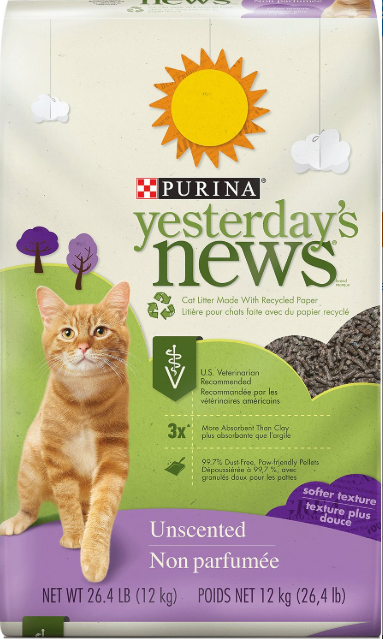 undergone surgery or have paw injuries. Paper litter doesn’t clump, it doesn’t produce any dust, and it tends to be on the softer side. This Yesterday’s News litter takes the gentleness a step further. It’s made particularly for cats with sensitive paws and has a softer texture than the original Yesterday’s News.
undergone surgery or have paw injuries. Paper litter doesn’t clump, it doesn’t produce any dust, and it tends to be on the softer side. This Yesterday’s News litter takes the gentleness a step further. It’s made particularly for cats with sensitive paws and has a softer texture than the original Yesterday’s News.
It’s made from recycled newspaper that has been compressed into pellets. It’s hypoallergenic, fragrance-free, and doesn’t produce any dust. While it doesn’t clump, it’s intensely absorbent. That said, its odor control isn’t the best. You’ll have to change the litter regularly to avoid serious odor buildup.
Ultimately, this is a low-performance litter, but it provides unparalleled performance for cats with sensitive paws.
Pros
- Won’t contaminate healing wounds
- Fragrance-free
- Hypoallergenic
- Tender touch on sensitive paws
Cons
- Doesn’t control odors well
sWheat Scoop Multi-Cat Natural Wheat Cat Litter 
This litter has a texture similar to traditional clumping clay, but the wheat particles are slightly softer and more gentle under the paws. As we mentioned in our sWheat Scoop review, this litter’s performance isn’t the greatest—it creates soft, fragile clumps and its odor control isn’t stellar—but it’s soft, natural, and fragrance-free for sensitive kitties.
The litter creates a good bit of dust, so it might not be a good choice for cats with wounded paws. Like other plant-based litter, the wheat litter might trigger allergic reactions in some sensitive cats.
Read our full sWheat Scoop cat litter review here.
Pros
- Soft texture for sensitive paws
- Moderate clumping ability
- Low tracking
- Free of irritating fragrances and dyes
Cons
- On the dusty side
Okocat Super Soft Clumping Wood Litter 
Okocat is a company known for wood litter that breaks the pellet-shaped mold, providing litter that’s made of wood but has a gentler, more comfortable texture. This litter takes it even further by having a “super soft” texture that’s been milled down into particles the size of the granules in clay litter.
The litter is a clumping product with excellent moisture and odor absorption abilities. It’s extremely low-dust but tends to track.
Pros
- Has a soft texture for sensitive paws
- Effective odor control
- Easy to scoop
- Low-dust
Cons
- Has a tendency to track
- Clumping litter isn’t ideal for cats with paw injuries or healing wounds
Garfield Tiny Grains Cat Litter 
This litter is made from a blend of corn, cassava, and has a soft, sandy texture that’s easy on the paws. While the litter is soft on paws, it’s hard on odor, providing excellent odor control on par with the best clumping clay products. It’s a clumping litter that creates cohesive, easy-to-scoop clumps with the consistency of gummy bears.
One of the benefits of this litter is that it looks like glittering creamy-white sand, which makes it easy to identify the presence of blood or other abnormalities in your cat’s urine.
Pros
- Has a soft, sandy texture
- Has a light color that may aid in disease detection
- Creates cohesive, easy-to-scoop clumps
Cons
- Some reviewers say this litter is dusty
- Clumping litter isn’t recommended for recently-declawed cats
Pioneer Pet SmartCat All Natural Cat Litter 
This grass-based litter has a soft, fine, texture that’s similar to clumping clay. It creates firm, cohesive clumps, which makes scooping easy, but could make it a questionable choice for cats who are recovering from surgery or have wounded paws. In addition to excellent clumping, the grass litter has great odor control.
The litter is unscented and free of irritating additives, so it has a gentle touch on your cat’s sensitive paws.
Budget Alternative: Frisco All Natural Grass Cat Litter
Pros
- Has a soft texture for sensitive paws
- Excellent odor control
- Makes strong, easy-to-scoop clumps
Cons
- Clumping litter may stick in healing paws
- One of the most expensive litter products you can buy
When choosing litter for a cat with sensitive paws—or any cat, really—think about sand or dirt and work back from there.
Our radically natural nutrition philosophy says that the more similar your cat’s food is to a mouse, the better it is. Litter works in much the same way. We’re trying to replicate the kind of substrate your cat would naturally use to bury their waste, honoring their natural instincts as much as possible.
This philosophy will help you immensely when finding the best cat litter for a sensitive cat. While lumpy litter full of fragrances and dyes might appeal to humans, it doesn’t fulfill the cat’s biological expectation. Neither does a chunky litter made from wood.
Think about where your cat would bury their waste naturally and choose a product that resembles the substrate she instinctively chooses.
If her paws are extremely sensitive, your cat may seek out bedding or laundry piles instead of the litter box. In this case, you might accommodate her desire for softness with a soft paper litter or even a pile of shredded newspapers.

